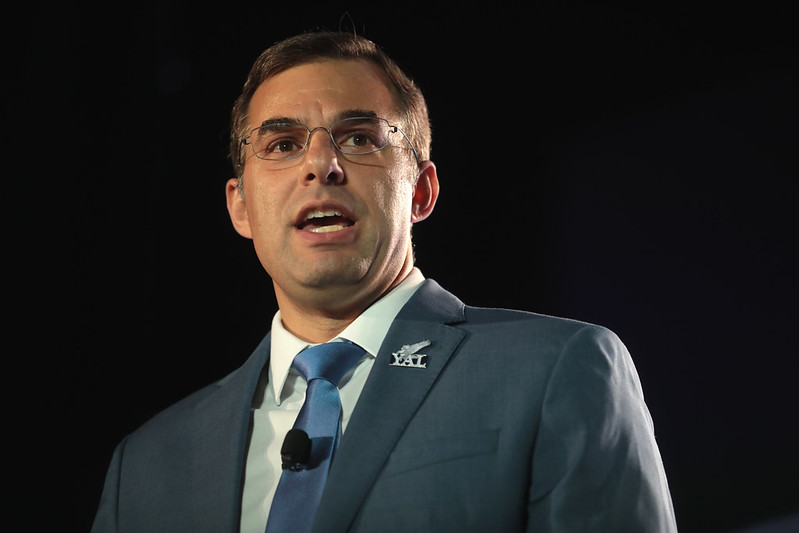U.S. Rep. Amash is leading an effort to overturn a decades-old doctrine that makes it nearly impossible for people to sue police officers who break the law in brutal ways.
U.S. Rep. Justin Amash (I-MI) is co-sponsoring legislation that would make it easier for ordinary citizens to sue police officers who violate their civil rights.
Amash, an ex-Republican who now works on a Libertarian platform, introduced the bill on Thursday. He is sponsoring the proposal alongside fellow U.S. Rep. Ayanna Pressley, a Massachusetts Democrat.
The bill has an additional 16 co-sponsors, including U.S. Rep. Rashida Tlaib (D-MI).
“We’ll work relentlessly to build support within Congress for this critical legislation,” Amash wrote on Twitter. “Police must be held accountable when they violate people’s rights.”
Amash’s district, which includes the West Michigan city of Grand Rapids, has seen mass anti-police protests since the May 25 death of George Floyd in Minneapolis. Floyd, an African-American truck driver, was arrested on suspicion of trying to pay for a small purchase with a counterfeit $20 bill. When law enforcement arrived, Floyd was thrown to the ground; a Minneapolis police officer continued to restrain Floyd by locking the man’s neck under his knee.
The incident was caught on film. Clips of the incident evidence Floyd repeatedly pleading with the restraining officer, telling him that he cannot breathe with a knee atop his neck.

Floyd lost consciousness and was dead by the time he was taken by emergency services. His death followed several other high-profile incidents of murder and harassment of black Americans.
Downtown Grand Rapids, like many other American cities, has experienced mass protests and limited incidences of rioting in response to Floyd’s death. Many protesters have demanded that police officers be held accountable for brutality and excess force.
Amash’s proposal explicitly seeks to ensure that police officers who engage in civil rights violations are not immune or exempt from civil liability.
The Detroit News notes that police officers—like some other categories of government workers—are broadly immune from civil litigation. While federal law dating to the 19th century allows private parties to sue state and local officials who violate their civil rights—including police officers—Supreme Court precedent penned in the 1960s created the concept of “qualified immunity doctrine.”
Qualified immunity doctrine, broadly, exempts police from civil rights lawsuits if the right they are alleged to have violated is not “clearly established” at the time of the violation. In other words, explains the Detroit News, plaintiffs must show that “a court in the same jurisdiction found in a previous case involving the same facts that a constitutional violation occurred.”
Such an obvious roadblock ties into another of protesters’ main complaints: that the institutional nexus between police and prosecutors often means that cops clearly guilty of civil rights violations are never even indicted. And, oftentimes, police departments are left to lead investigations into wrongdoing committed by their own officers.
During the ongoing protests, numerous video clips have surfaced showing police across the country brutally—and often senselessly—beating, tear gassing, and pepper spraying visibly peaceful protesters.
“Qualified immunity protects police and other officials from consequences even for horrific human rights abuses,” Amash said in a statement.
“The pattern continues because police are legally, politically, and culturally insulated from consequences,” Amash wrote. “That must change so that these incidents of brutality stop happening.”
However, Amash’s initiative may face some roadblocks. Peter Henning, a criminal law professor at Wayne State University, told ClickOnDetroit.com that Amash may be fighting an uphill battle.
“He’s going to try to push it through the Judiciary Committee, but I have my doubts as to whether that will ever happen,” Henning said.
“Immunity has been part of the system since the mid-1960s,” he added. “Getting rid of absolute immunity for police officers is going to be very, very, very difficult.”
Henning also said that qualified immunity could shield Floyd’s killer, Derek Chauvin, from any real consequences.
“We’re going to see that police officer being charged with a crime,” Henning said. “But can he interpose absolute immunity? The answer to that question may well be yes.”
President Donald Trump, who has likened peaceful protesters to “terrorists,” has also signaled that he would not sign any legislation weakening protections for police officers who violate Americans’ civil rights.
Sources
Amash bill would make it easier to sue cops who violate civil rights
Rep. Amash proposes bill to end legal immunity for police
U.S. Lawmaker Prepares Bill Aiming to End Court Protection for Police


Join the conversation!